|
|
|
Sort Order |
|
|
|
Items / Page
|
|
|
|
|
|
|
| Srl | Item |
| 1 |
ID:
154988
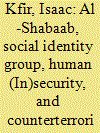

|
|
|
|
|
| Summary/Abstract |
This article examines the link between human security, social identity, and al-Shabaab. The first section explores how social identity group theory can help explain al-Shabaab's recruitment. The second part focuses on the counterterrorism campaign against al-Shabaab, which involves decapitation, aggressive peacekeeping through a proxy in the shape of the African Union Mission in Somalia, and the role of a domestic de-radicalization program. The article concludes that al-Shabaab's allure is in decline and the group is facing internal turmoil, which makes its overtures toward the Islamic State of Iraq and the Levant very dangerous, as al-Shabaab could act as an effective conduit between the Arabian Peninsula and Africa.
|
|
|
|
|
|
|
|
|
|
|
|
|
|
|
|
| 2 |
ID:
175674


|
|
|
|
|
| Summary/Abstract |
This study looks at the challenge that cryptocurrencies could pose to national security as it pertains to terrorism. The study begins by untangling what are cryptocurrencies before shifting attention to how criminal use cryptocurrencies and how terrorist could use cryptocurrencies. One of the key issues identified is the lack of an international regulatory regime, including, a definition of what are cryptocurrencies and how one could regulate the sector. By engaging in such research, this study seeks to encourage international society to focus more on cryptocurrencies and develop an effective, binding regulatory regime.
|
|
|
|
|
|
|
|
|
|
|
|
|
|
|
|
| 3 |
ID:
164618


|
|
|
|
|
| Summary/Abstract |
This article argues that because the EU is more concerned with Turkey serving as a barrier to those seeking refuge in Europe, it has empowered the Erdoğan regime to continue to adopt and implement measures that undermine Turkish democracy. Such a myopic approach has allowed Erdoğan to usurp more power, which has had dire consequences for European security as it means that Europe would share a border a with a nondemocratic state. It also makes it harder for the EU to work with Ankara, because if the EU criticizes or imposes sanctions it makes it more likely that Erdoğan would gravitate toward Russia and Iran, thus further undermining European security, as the EU has a complex relationship with these two countries, particularly Russia. It is only by taking some tough decisions on migration that the EU could solve the insecurity challenge that Turkey poses.
|
|
|
|
|
|
|
|
|
|
|
|
|
|
|
|
| 4 |
ID:
191524


|
|
|
|
|
| Summary/Abstract |
This paper examines the under-studied area of innovation and terrorism. Beyond exploring the debate on the difference between creativity and innovation and how it impacts terrorist groups, the paper also reviews the typology of terrorist innovation and of the law of unintended consequences. The presence of terrorist groups in the online gaming world is an example of creativity and innovation as the groups recognize that counterterrorist policies have limited their ability to communicate with potential recruits. Consequently, extremists have had to find new avenues to communicate with supporters and attract potential recruits as they are determined to survive. Security agencies must also ensure that they are also thinking ‘outside the box’ as only through creativity can they stay one-step ahead of their adversaries.
|
|
|
|
|
|
|
|
|
|
|
|
|
|
|
|
| 5 |
ID:
137280


|
|
|
|
|
| Summary/Abstract |
It has become increasingly difficult to ascertain the value of NATO for its member states, necessitating an honest conversion debate as to the alliance's future. The article analyses why NATO is becoming extraneous by reviewing NATO's role in Afghanistan and Libya, the emerging threats to the Euro-zone, and the development of a European Union's Common Foreign and Defense Policy, which is understood as laying the framework for an EU strategic culture. The final section offers some suggestions on how NATO can continue to play a role in international relations with its maritime component.
|
|
|
|
|
|
|
|
|
|
|
|
|
|
|
|
| 6 |
ID:
083670


|
|
|
|
|
| Publication |
2008.
|
| Summary/Abstract |
The article explores the development of Islamic radicalism in East Africa by examining specific states. The author argues that the evidence suggests that although Islamic radicalism has not made substantial inroads into the region, it may still do so, as East Africa suffers from political repression as well as socioeconomic problems. The author concludes that the region must undergo significant changes to improve political representation and socioeconomic conditions.
|
|
|
|
|
|
|
|
|
|
|
|
|
|
|
|
| 7 |
ID:
150115


|
|
|
|
|
| Summary/Abstract |
This article argues that NATO is unable to challenge any of President Putin's expansive policies for two key reasons: First, Europe and the United States have conflicting views on what events qualify as key security threats (different threat perceptions). Infused within this paradigm is a nascent European Union strategic culture that views threats differently from the U.S. This in turn undermines NATO, as the Europeans argue for largely nonmilitary or more peacekeeping-oriented approaches to respond to threats that are quintessentially multilateral. Second, even though there are major differences between the NATO states and Russia, the two most pressing issues before the Atlantic Alliance are Iran and Syria. The NATO states know that a resolution to the Syrian civil war or to Iran's nuclear program is unlikely without the support of Moscow, which limits their ability to effectively challenge Russia. This article concludes with a call for NATO to focus on identifying a new agenda for the Atlantic Alliance, one that is more human-security oriented, as it addresses the root causes of instability in and around the Eurozone.
|
|
|
|
|
|
|
|
|
|
|
|
|
|
|
|
| 8 |
ID:
140337
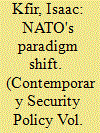

|
|
|
|
|
| Summary/Abstract |
Although recent years have seen more talk about Article 5 and the need for NATO to stand up to an expansive Russia, NATO states are unlikely to engage in a new Cold War with Russia. Instead the alliance continues to explore its agenda in the post-Afghanistan and post-Crimea period. One answer to these tensions is to develop an agenda stressing human security to counter the pervasive threats of regional instability and terrorism. After reviewing the alliance's Military Concept Against Terrorism (MCAT), the deliberations of the 2012 Chicago and 2014 Wales Summits, and the European Union's Common Defence and Security Policy (CSDP), this article explores two propositions. First, that the vacillating commitment of alliance members who chose to address security issues through EU mechanisms or optional coalitions of the willing threatens NATO's relevance. If NATO's members are unclear about the alliance's agenda and identity, others cannot know what the alliance is willing to do to protect its interests. Second, by developing Military Concept against Terrorism and Smart Defence along a human security framework coupled with maritime operations would enable the alliance to better satisfy the needs of its European members, allowing them to employ NATO to support the EU's Common Defence and Security Policy, and ensure a continued reliance on NATO. As one area where there is a consensus between NATO's European members and the USA, counterterrorism is the most promising field that the alliance can focus on. NATO, therefore, should position itself as a key counterterrorism force, albeit one that is not strictly kinetic.
|
|
|
|
|
|
|
|
|
|
|
|
|
|
|
|
| 9 |
ID:
162654


|
|
|
|
|
| Summary/Abstract |
The Sahel region is home to several groups that profess to be jihadi in orientation. To raise funds, these groups rely on criminal activity that nets them millions of dollars, and helps them embed within local communities. As worrying as the presence of these entities is, what is of greater concern is the way the United States and France have militarized the region. The argument made in this article is twofold. First, the appeal of the Sahel jihadi-criminal groups is based in pervasive human insecurity and not theological affinity with radical Islam. Second, the counterterrorism and counterinsurgency policies promoted by the United States and France militarize the region and are likely to cause more instability. It is imperative to rethink interventionist policy in the region.
|
|
|
|
|
|
|
|
|
|
|
|
|
|
|
|
| 10 |
ID:
114608
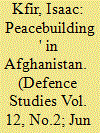

|
|
|
|
|
| Publication |
2012.
|
| Summary/Abstract |
Following the 9/11 attacks, the United States, with the approval of the international community and the support of a number of states, invaded Afghanistan. The mission had two aims. The first was to search out and capture or kill those members of Al-Qaeda responsible for the 9/11 attacks. A second objective was to rebuild Afghanistan in the hope that by removing the conditions that facilitated the rise of the Taliban, Afghanistan would cease to be a threat to international peace and security. The present paper, divided into three main sections, examines what the international community is striving to do in Afghanistan and explores whether 'peacebuilding', as understood by the international community, is achievable.
|
|
|
|
|
|
|
|
|
|
|
|
|
|
|
|
| 11 |
ID:
132197
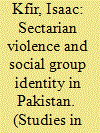

|
|
|
|
|
| Publication |
2014.
|
| Summary/Abstract |
Individual basic security is limited in Pakistan as the state is institutionally weak. One way to attain basic security is by joining groups who provide security and services. Consequently, groups not part of the political mainstream, to attract a following, must therefore show that they are sufficiently powerful to obtain concessions from established actors. Thus, by engaging in violence primarily of a sectarian nature, the Pakistani Taliban sustains itself as a unified force while also highlighting that it is a powerful group, which in turn it hopes would enable it to curve a political space and win concessions from the established elite. Using social group identity theory, club goods, and the economics of extremism, the article highlights why the Pakistani Taliban has increasingly attacked minorities and why more must be done to address sectarian violence.
|
|
|
|
|
|
|
|
|
|
|
|
|
|
|
|
| 12 |
ID:
137792
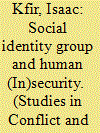

|
|
|
|
|
| Summary/Abstract |
The article uses social identity group theory and human insecurity to examine the rise of the Islamic State in Iraq and the Levant (ISIL). After first defining social group identity and its characteristics, the article reviews the Al Qaeda ideology that serves as the foundation of ISIL, before turning attention to the message and legacy of Abu Musab al-Zarqawi and their profound influence on ISIL. The article concludes by arguing that only by ending the marketplace of identities can stability be restored to Iraq and Syria.
|
|
|
|
|
|
|
|
|
|
|
|
|
|
|
|
| 13 |
ID:
133561


|
|
|
|
|
| Publication |
2014.
|
| Summary/Abstract |
Robert Johnson's The Afghan Way of War: How and Why They Fight is a book that should be particularly read by military and civilian personnel deploying to Afghanistan, even though it is not designed to be a policy guide (p. 4). Although Johnson's analysis of the Taliban period and the post-2001 US-led invasion is weak, overall the book delivers a thoughtful analysis of how and why Afghans fight, making it clear that conceptions of 'friends and enemies' carry different implications for Afghans than for westerners, as Afghans are highly conscious of prevailing circumstances. The appeal of the book is that it examines whether an Afghan 'way of war' exists and if so what motivates and drives it. To Johnson, the 'Afghan way of war' is based on topography, culture, opponents' strengths and weaknesses, financial inducement and religion. Although taking an historical approach, Johnson is careful about drawing lessons from history, arguing that historical assessments '…convey values that have been discredited in the West,' (p. 301). An added benefit of the book is Johnson's willingness to investigate Afghan domestic wars and not restrict the study to how the Afghans engaged foreigners, allowing him to declare '…there was no single Afghan way of war in the country's history. Every response has been dependent on the situation that confronted the Afghans,' (p. 36). This may explain why Johnson seems to reject the perception that when it comes to Afghanistan guerrillas do not have an added advantage on conventional forces as these forces, whether Taliban or Mujahedeen, have to contend with a chaotic command and control system, disloyalty, rivalry, poor discipline, assassination threats and weak logistics (p. 303). Johnson's meticulous research allows him to highlight that whether during the First Anglo-Afghan War or the Afghan wars of the mid-nineteenth century, which occurred mainly between the Durrani tribes, Afghans have had to deal with extreme internal divisions that led some Afghans to work with external forces. In other words, political expediency and survivability is what governs the Afghan way of war.
|
|
|
|
|
|
|
|
|
|
|
|
|
|
|
|
|
|
|
|
|